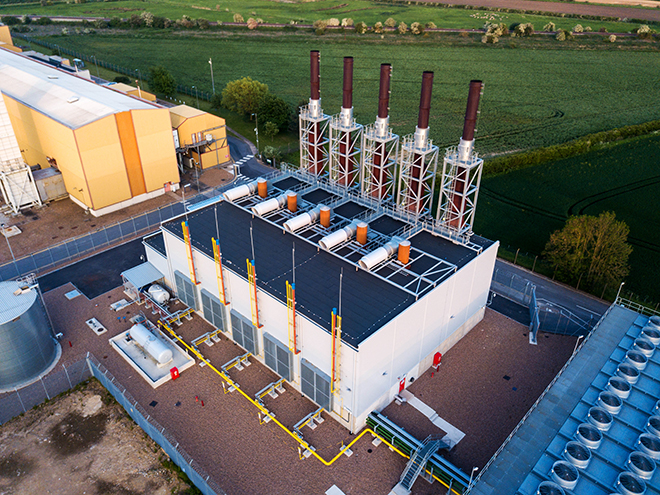S&P Global Offerings
Featured Topics
Featured Products
Events
S&P Global Offerings
Featured Topics
Featured Products
Events
S&P Global Offerings
Featured Topics
Featured Products
Events
Banking & Capital Markets
Economy & Finance
Energy Transition & Sustainability
Technology & Innovation
Podcasts & Newsletters
Banking & Capital Markets
Economy & Finance
Energy Transition & Sustainability
Technology & Innovation
Podcasts & Newsletters
S&P Global Offerings
Featured Topics
Featured Products
Events
29 Jan, 2021
By Yannic Rack

| A gas-fired power plant in the U.K. Enel, one of the largest utilities in the world, said it will phase out the fuel to reach its 2050 net-zero target. |
Enel SpA is planning to entirely phase out natural gas from its portfolio as it shoots for a net-zero emissions target, arguing that technology to capture carbon has proven to be a bad bet in energy companies' quest to decarbonize.
"We have a net-zero target for 2050. That's clearly a future where there is no gas," Salvatore Bernabei, CEO of Enel Green Power, the utility's global renewables arm, said in an interview Jan. 29. "We don't believe in technology that offsets CO2."
The Italian utility is both one of the largest renewable energy generators in the world and one of Europe's biggest carbon emitters. It generated direct emissions of about 70 million tonnes of CO2 equivalent in 2019, according to data from Trucost, a part of S&P Global Market Intelligence, including from a dozen coal power plants, mostly located in Spain and Italy.
That is less than Germany's RWE AG, which has more coal plants in operation but far exceeds the 13 million tonnes generated by Spain's Iberdrola SA, a more similarly structured utility and one of Enel's closest rivals.
While Enel has said it wants to shut down all of its coal plants by 2027, in large part because of worsening economics for the fuel, it is still building gas projects. In Italy, the company wants to convert at least four of its five remaining coal plants to burn natural gas instead. The company already owns 15,000 MW of combined-cycle gas power plants in Europe and South America and expects that number to remain stable until at least 2022.
Still, Enel expects to lower its emissions intensity to 254g/kWh in 2020, down from 409g/kWh in 2015. By the end of the decade, it wants to cut its remaining intensity in half, before reaching net-zero emissions in 2050.
'Why do it again?'
Although the company could rely on carbon offsets or carbon capture to hit that target, Bernabei said the technology has failed to take off, despite receiving funding from the EU and national governments. He said there is no reason to expect that situation to change, especially since carbon capture and storage, or CCS, technology is not guaranteed to eliminate 100% of emissions.
"These are very big and complex projects. And at the end, they will not solve the problem," Bernabei said. "We already tried CCS in the past and it didn't lead to success. So why do it again?"
Some utilities and oil companies have still touted CCS as the solution to the net-zero conundrum. Drax Group PLC is trialing CCS technology at the U.K.'s largest power plant, while Occidental Petroleum Corp. is building a business model based around capturing CO2 and using it for enhanced oil recovery.
U.S. utility Southern Co. also plans to reach net-zero emissions by 2050 but has said it will own gas plants past that date. The company runs a National Carbon Capture Center to research and develop CCS technology together with the U.S. Energy Department.
Deloitte said in a report published in September 2020 that a survey of power and utility executives showed CCS was the top pick among measures to enable a low-carbon future strategy. But the consultancy pointed out that there remains "a significant financing gap" to deploy the technology cost-effectively, despite a recent tax credit in the U.S.
Bernabei's predecessor as CEO of Enel Green Power, Antonio Cammisecra, said in an interview in June 2020 that Enel's decarbonization efforts could still involve nature-based solutions, such as reforestation, to get all the way to net-zero.
Green growth
Enel's renewables portfolio, meanwhile, keeps growing. The utility installed a record 3,106 MW in 2020, most of it wind farms in the U.S., Europe and South America.
Bernabei said that during 2021, Enel will mainly add capacity in Chile and Brazil, but the company also wants to install more than 700 MW of new renewables in Spain and about 1,000 MW in the U.S., where the executive sees improving prospects under new President Joe Biden.
Although state efforts meant renewables development continued under former President Donald Trump, "the outlook is more positive than in the past," he said.
The Biden administration has already unveiled a raft of green policies aimed at speeding up the energy transition. Bernabei said Enel could benefit by signing more power purchase agreements with corporations looking for clean energy and more broadly supply power to a grid seeing increasing demand from electric vehicles, for example.
Enel said in 2020 that it planned to spend about €70 billion on renewables by 2030 to almost triple its installed consolidated capacity to 120,000 MW by 2030.
